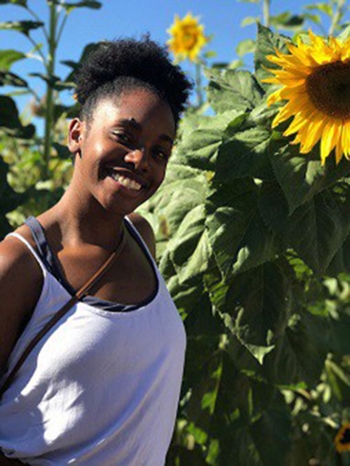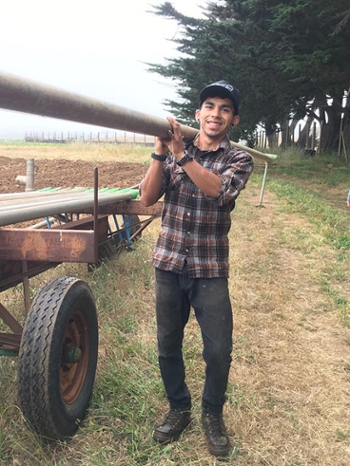Makshya Tolbert and David Robles, participants in UC Santa Cruz’s 2018 Apprenticeship in Ecological Horticulture training program, have received Future Organic Farmer grants from the California Certified Organic Farmers Foundation. Offered to students in higher education and vocational programs in organic agriculture, the competitive grants provide help with tuition and other educational expenses.
Tolbert is part of the six-month training program in organic farming and gardening at the UCSC Farm & Garden, coordinated by the Center for Agroecology & Sustainable Food Systems (CASFS). Robles, a 2017 Apprenticeship graduate, is continuing his training and serving as an assistant instructor in this year’s Apprenticeship program as he helps run the UCSC Farm’s hand-worked gardens.
Before coming to the Apprenticeship, Makshya Tolbert worked most recently in New York City on projects to prioritize racial equity in the food system. In describing what drew her to farming, she says, “Organic farming is a trade and lifestyle that naturally lends itself to storytelling. I first found that to be true as an undergrad, studying the intersection of nature poetry and black history and wanting to write poems that expressed the intimacy between the two.”
She notes that as she began learning to grow food on campus farms and gardens. “I felt empowered to write about my experiences. I was eager to fill the gap of women of color farmers, striving to reassert our multidimensional roles across the environment,” says Tolbert. “Farming has taught me to love working with my hands. What began with organic farming at Stanford has evolved into seeing myself as a cook and potter who feels most empowered when my hands are wedging, blending, kneading, and carving.” Following graduation, Makshya will be part of the Agroecology Fellows cohort for 2018-19, continuing her learning at the UCSC Farm & Garden, and serving as an assistant instructor for the 2019 Apprenticeship class.
Agriculture has long been a part of Robles’s life. “My family history cannot be separated from agriculture. Food systems form the foundation of my culture and because of this I find myself shaping my entire career around food systems work. As a Mexican-American in California I have a complex relationship with the ag industry. Part of me is grateful that my family was able to migrate here as Braceros during the 1940s. They sought better opportunities for later generations and understood that the conditions they confronted and overcame were obstacles that I would be spared from. But I am also conflicted by the fact that they wanted to participate in a food system that imported labor.”
Robles, who earned his undergraduate degree at UCSC in the History of the Americas, started working at the UCSC Farm as an undergraduate and became a student farm manager, as well as working with students from the FoodWhat?! youth empowerment program. He sees youth as critical to changing the food system and hopes to model that change for them.
“The growth of organic food has inspired a generation of youth to plug in and help further our movement. It will be absolutely essential to carry the momentum that is gained from interested youths. We cannot build a movement that revolves around sustainability unless we sustain the transfer of knowledge and responsibility,” says Robles. “I have worked with young folks for many years now in an agricultural context and have served as a role model for them as I help push our movement forward. The next logical step is to continue policy work, run for office, develop educational programs, etc. so that as these youths grow, there will be role models to follow and opportunities to take.”
The CCOF Foundation offers grants through the Future Organic Farmer Fund in three categories: Kindergarden through eight grade teachers, high school students, and higher education and vocational students pursuing degrees or certificates in organic agriculture. to help with tuition and educational expenses. To qualify for Vocational and Higher Education grants, applicants must be enrolled in an educational program in the United States that will benefit their career in organic agriculture, including vocational training/certificate programs, junior college/two-year degree programs, and bachelor’s/four-year undergraduate degrees. Learn more at the Future Organic Farmer Grant Fund link.


